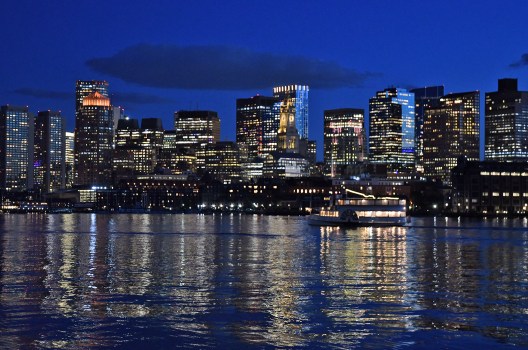The Boston City Council passed a resolution calling for the Wu administration to establish a Blue Ribbon Commission to address downtown office vacancies that have one watchdog warning of a nearly $2 billion budget shortfall in five years.
The Council this week passed the non-binding resolution by a 12-0 vote, with one councilor, Sharon Durkan, voting present. The approval marks the
second time
the Council has indicated its support for such a commission.
Introduced by Councilor Ed Flynn, the measure calls for the city to establish a commission composed of business leaders, city and state officials, neighborhood advocates and other relevant experts “to study the impact of the office vacancies and recommend strategies to fill these vacancies, address city budget revenue, and ensure the long-term economic vitality” of Boston and the surrounding region.
“Vacancy rates impact the value of real estate, which in turn impacts the amount of property taxes the city collects,” Flynn said at this week’s Council meeting.
Flynn referenced a report
released last week
by the Boston Policy Institute in conjunction with the Center for State Policy Analysis at Tufts University that projected office vacancies could leave the city with a $1.7 billion budget shortfall over the next five years.
The potential shortfall is driven by a projected 35-45% decline in office values in five years, compared to the 20-30% decline in values BPI and Tufts
initially projected
in a report last year, when it was estimating a $1.2-$1.5 billion shortfall.
The latest report estimates that a $1.4 billion budget shortfall is a best-case scenario with the city facing a revenue shortfall of up to $2.1 billion in five years.
Flynn also cited a report from the real estate firm Cushman & Wakefield that found the office vacancy rate in Boston is at 17%, up from 15.1% last year.
Vacancies are impacting office sales transactions, according to Flynn, who said that “over the last year, a number of high-profile buildings in the downtown have sold for large discounts.”
An office building at 101 Arch St. sold for $78 million compared to its 2005 sales price of $121.7 million, and One Lincoln St., formerly known as the State Street building and now HarborVest, sold for $400 million at a foreclosure auction in March this year, less than half of its value a few years ago, he said.
He further mentioned 99 High St., which sold for $227 million in late April compared to what it was bought for at $273 million in 2005. That building’s assessed value is $373.7 million, Flynn said.
Those dynamics, vacancies and the resulting falling office values, all exacerbate a city budget structure that derives roughly three-quarters of its revenue from property taxes, with a third of that revenue coming from commercial properties, according to the resolution approved by the Council.
“Commercial real estate executives in Boston have expressed serious concerns about the future of the city’s office space, and asked for assistance from local, state and federal officials to play a key role in helping to bring more workers and foot traffic back downtown,” the Flynn-led resolution states.
“There are also continued concerns that falling commercial property prices would spike property taxes for residential homeowners.”
Homeowners on average saw a double-digit increase in their property taxes for their third-quarter bills this past January.
“Addressing our office vacancies is also a critical component to a revitalized downtown, and filling office vacancies will also be important in ensuring the stability of our city’s tax base and budget,” the resolution states.
Mayor Michelle Wu’s office did not respond to a request for comment on the Council’s push for a Blue Ribbon Commission.
Wu struck a more optimistic tone about the city’s downtown real estate market last week, however, when she was asked by reporters to respond to the latest projections in BPI’s office vacancies report, and again this week when signing the city’s $4.8 billion budget for fiscal year 2026.
“It’s unclear where their facts are coming from,” Wu said of BPI. “Last year’s report also stated that there would be, over the next five years, a $1.5 billion revenue loss. We are 20% into that next five-year period now and have not experienced a revenue loss whatsoever. Our budget is balanced.”
Wu further described BPI as a “shadowy organization” that is “looking to tear down the city’s progress.” She had
dismissed last year’s report
by BPI as “false information.”
At a
budget signing ceremony
last Monday, Wu also described the city’s finances as strong, while speaking to the potential economic impacts from the Trump administration’s
threats to cut federal funding
to Boston and other sanctuary cities, rather than falling office values and the resulting decline in commercial revenue.
“Although we are facing the same uncertainty that cities everywhere are dealing with right now, the reality is that Boston is in the best possible position to weather this moment,” the mayor said.
Related Articles
-
Disgraced Boston City Councilor Tania Fernandes Anderson resigns
-
Battenfeld: Michelle Wu’s duplicitous stunt the latest Democratic tactic
-
Josh Kraft cites housing inspection ‘failures’ under Michelle Wu administration in federal audit
-
ICE director says feds will comply with Michelle Wu’s order, readily share info on ‘illegal aliens’ Boston is ‘harboring’
-
Turmoil surrounds second probe into Boston City Hall workplace scandal
Wu mentioned her stalled tax shift legislation, which seeks to lower residential taxes by shifting more of the city’s tax burden onto commercial properties, to address the impact of falling office values on the city budget, when speaking with reporters last week.
The legislation was
killed by the state Senate
late last year amid opposition from the commercial sector, dealing Wu a political defeat after her yearlong battle to get it passed ahead of this past January’s property tax bills.
There’s been no movement on her
refiled tax bill
, Wu said, since it was
passed by the Council
and sent to Beacon Hill for a third time in February.












